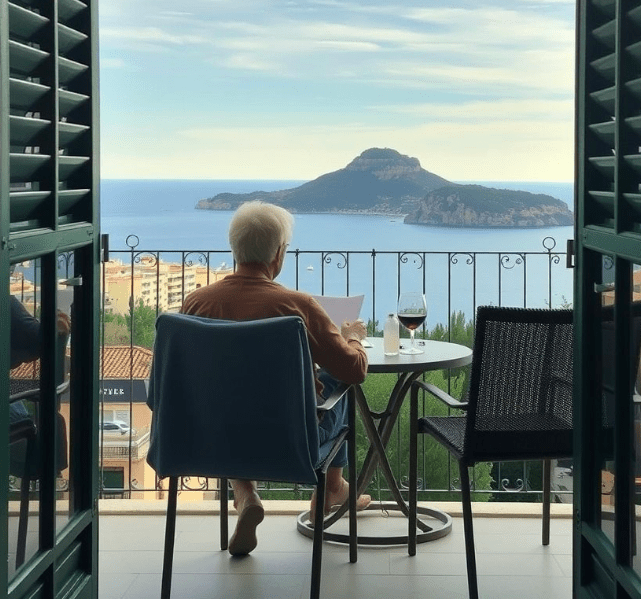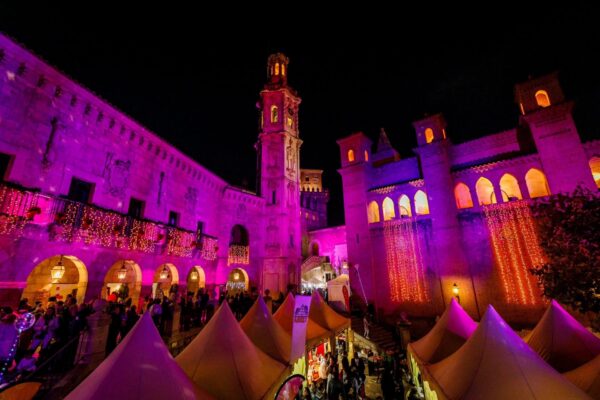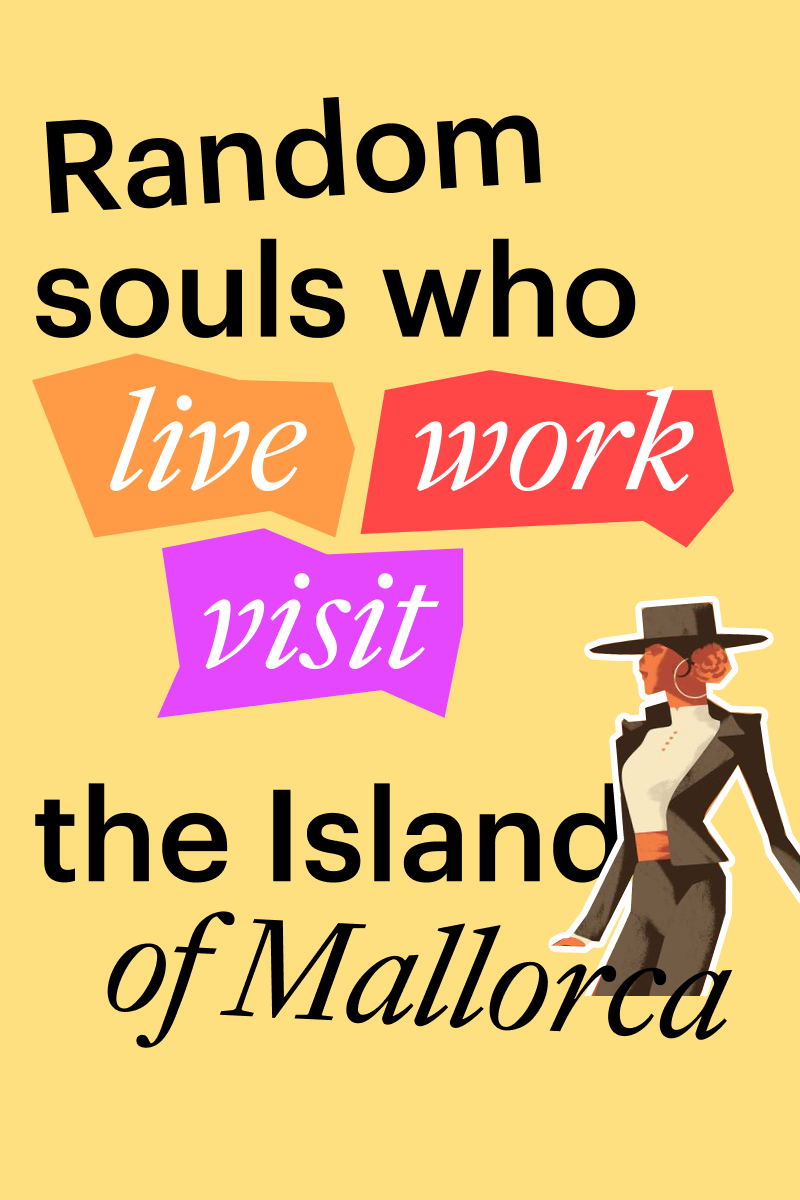The expat author is the kind of person who went on a four-day break to Mallorca, got mildly tipsy on some overpriced sangria, and suddenly thought, “I could live here forever.” Fast forward six months, and they’re swanning around a rented villa, hammering out books with titles like Sun, Sangria, and Siestas: My Year in Paradise or Olives, Oranges, and Overstatements: A Mediterranean Memoir. These books are marketed as “whimsical,” “heartfelt,” and “breathtakingly authentic” — phrases which roughly translate to “semi-fictional” and “written while day-drinking.”
Their books clutter airport bookstores, where stressed-out travelers pick them up, imagining a life of sipping wine under lemon trees while having deeply “meaningful” misunderstandings with charming locals who somehow never get fed up with them.
Appearance:
The Expat Author’s look is carefully curated, as if they just rolled out of bed into the middle of a photo shoot. They wear loose, flowing clothes that flutter just-so in the breeze, usually made of linen, because nothing screams “artistic expat” like creased fabric that costs a fortune to dry clean. Sandals are a must, preferably something that looks artisanal and uncomfortable, just to show how “connected” they are to nature.
They carry a well-worn leather notebook, the kind that makes you think they’re constantly jotting down brilliant, Pulitzer-worthy ideas. In reality, that notebook is full of grocery lists, but it’s all part of the aesthetic. It’s there to suggest their genius is always bubbling just beneath the surface, ready to burst forth into literary brilliance at a moment’s notice — preferably after a second glass of rosé.
Habits:
The Expat Author lives in a fantasy world where their life is a series of picturesque vignettes. They spend their days lounging in rustic cafés, sipping café solo, and pretending to be inspired by the “rich tapestry of local life.” In reality, they’re usually just refreshing their Amazon sales rankings on their phone or trying to figure out how to turn a minor inconvenience — like the grocery store running out of fresh bread — into a whole chapter of deep philosophical insight.
When they’re not “writing” (which means talking about writing more than actually doing it), they can be found wandering around local markets, buying overpriced baskets of organic oranges. Naturally, these small, mundane moments get stretched into chapters filled with breathless ruminations on the simple joys of Mediterranean life. Every burnt omelet, every missed bus becomes a meaningful anecdote in their next book, woven into a narrative that makes you think they’re living in a magical wonderland, rather than an Airbnb with terrible Wi-Fi.
Behavioral traits:
The Expat Author is a walking content farm. Every tiny interaction with a local becomes fodder for their next “deeply personal” memoir. Did the bartender forget to add lemon to their water? That’s a three-page musing on cultural differences. Did they miss the market closing time by five minutes? Suddenly, it’s a heartfelt reflection on the value of patience. Every trivial moment is a potential metaphor waiting to be milked dry. They are masters of turning the most banal experiences into something deep and philosophical, like the time they got lost in Palma and discovered a hidden courtyard that “changed their perspective on life.” (In reality, it was just a parking lot.)
Their books are filled with “quirky” characters, which are really just exaggerated versions of locals they’ve met once and never bothered to speak to again. The grumpy old fisherman who grunted at them for parking too close to the harbor becomes a wise philosopher with a heart of gold imparting life lessons. The woman who gave them a look of confusion when they asked for gluten-free pa amb oli morphs into a charming but stern maternal figure, part of the “real Mallorca” they love to write about but don’t quite understand.
Interactions with locals:
Despite writing long, florid passages about their “deep connection” with Mallorcan life, the Expat Author’s actual interactions with locals are painfully awkward and limited. They’ve learned about four words of Spanish (and fewer even of Catalan), which they butcher with the confidence of someone who thinks pointing and smiling is a universal language. Any communication beyond “hola” or “gracias” descends into a mess of miming and apologetic laughter.
The locals tolerate them the way one might tolerate a well-meaning but slightly clueless tourist who keeps asking where they can find the “authentic” Mallorca. The truth is, they spend more time having conversations with their editor than they do with anyone on the island. But that doesn’t stop them from describing themselves as “immersed in the local culture” in every book blurb.
Natural habitat:
The Expat Author thrives in photogenic settings. They love staring thoughtfully over olive groves as if the muse were about to appear at any moment from behind that dry-stone wall. (Nope, that’s a goat). On weekends, you’ll find them wandering through cobblestone streets, getting intentionally lost in “charming” villages, where they’ll “accidentally” stumble upon a tiny restaurant run by a local family (which is always conveniently empty for some reason). Indeed, they spend a lot of time in “charming villages”, where they can marvel at the “old-world charm” of cracked walls and stray one-eyed cats.
Their “office” is any rustic café that has good lighting for Instagram photos, where they spend more time taking shots of their latte art than writing. They’re often seen in those “hidden gem” spots — meaning places they saw on a travel blog.
Social Media Presence:
Their Instagram feed is a parade of carefully staged shots. There’s the obligatory “sipping wine at sunset” photo, the “artfully placed notebook next to an untouched plate of tapas” shot, and the “gazing off into the distance while holding a glass of rosé” picture. Every caption is some variation of “Feeling so inspired by this beautiful island! 💙 #LivingMyBestLife #MallorcaDreams.” Behind the scenes, they’re probably having an existential crisis over their dwindling royalties and crushing deadlines.
They use social media to promote their books, of course, dropping casual hints like, “Spending the afternoon writing my next bestseller in this lovely café” (read: drinking wine and hoping the Wi-Fi holds up).
Conclusion:
The Expat Author Who Writes Bestselling Books About Living in Mallorca has found a way to turn their relatively mundane existence into a profitable narrative of self-discovery, cultural miscommunication, and exaggerated charm. They’ve mastered the art of making life on the island look like a spiritual journey, all while hiding the reality of deadlines, Amazon rankings, and mild sunburn. And if they can spin their run-ins with local shopkeepers into bestselling literary gold, why not let them? After all, it’s a tough job, but someone’s gotta do it — preferably with a glass of Mallorcan wine in hand.








